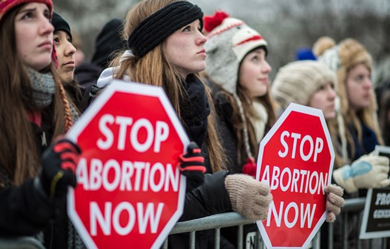Yesterday, voters in Tennessee approved a ballot measure amending the state constitution to remove all legal protections for abortion rights, paving the way for state lawmakers to pass broad abortion restrictions. At the same time, voters in Colorado and North Dakota overwhelmingly rejected “personhood” measures that would have given the full rights of citizenship to zygotes, thereby criminalizing all abortion along with some forms of birth control. In Colorado, where the nation’s foremost personhood advocacy group is based, it was the third time such a measure had been rejected by voters.
Yesterday’s results are the product of a split among the anti-choice movement about how to achieve the goal of criminalizing all abortions. While most of the movement shares this end-game, its leaders are bitterly divided over the best strategy to achieve it.
The nation’s largest and best-funded anti-choice groups, including National Right to Life, Americans United for Life and the Susan B. Anthony List, favor an incremental approach to chipping away at the protections guaranteed in Roe v. Wade. The incremental strategy has had tremendous success in recent years as measures on the state level have forced scores of abortion clinics to shut their doors. Women in Cincinnati, for instance, still have a legal right to an abortion. But thanks to a recent law aimed at shutting down abortion providers, they may soon lose access to the city’s only clinic that provides the service.
And even in North Dakota, although zygotes won’t be given the legal rights of people (at least for the time being), anti-choice activists are targeting the state’s sole abortion provider, which was struggling to keep its doors open and was recently banned from administering medical abortions.
The personhood movement is angry at mainstream anti-choice leaders for being willing to accept “compromise” legislation that includes exceptions for survivors of rape and incest. But it also thinks that the incremental strategy won’t work. Instead, personhood advocates seek to take advantage of a loophole in Roe v. Wade by which, they believe, if a zygote or a fetus is defined by law as a legal person, Roe’s abortion protections will fall. Groups pushing the so-far unsuccessful personhood ballot measures have allies in this strategy in some far-right judges, most notably on the Alabama Supreme Court, who are trying to build a legal framework for undermining Roe.
On the electoral level, the personhood strategy’s biggest flaw may be it is just too honest about the goals of the anti-choice movement. While Americans are fairly evenly split between those who call themselves pro-choice and those who choose the label pro-life, 70 percent want to keep Roe v. Wade and only 24 percent want to overturn it. Americans have muddled views about circumstances under which they think abortion should be legal, but know that they don’t want it to be completely criminalized.
Groups like Americans United for Life and the Susan B. Anthony List know this and have stayed far away from personhood measures. When a Mother Jones reporter asked AUL for a comment on North Dakota’s measure, a spokeswoman replied, “AUL does not handle personhood issues.”
But other national groups have supported these measures. While National Right to Life’s affiliate in Colorado opposed that state’s measure , saying it would be “immediately overturned in court,” the national group’s North Dakota affiliate backed its state’s even more extreme measure. And while Colorado Republican senator-elect Cory Gardner ran away from the personhood issue, both of North Dakota’s senators supported the ballot measure in their state. The Family Research Council’s North Dakota affiliate also got behind the measure in its state, along with the state chapter of Concerned Women for America and the North Dakota Catholic Conference.
And despite the unpopularity of their bills at the ballot box, personhood advocates still have a strong hold in Congress, where “life at conception” bills have 22 sponsors in the Senate and 133 in the House.
But in the end, even as anti-choice Republicans won handily in Colorado and North Dakota, the personhood measures went down in flames, leading the proponents of the Colorado proposal to rejoice that they at least lost less badly than they had in the past.
The victory of the measure in Tennessee — which will allow legislators to broadly cut off access to abortion rights without explicitly criminalizing abortion — shows that, for now, the incrementalists’ strategy is winning. Even voters in dark-red states like North Dakota can’t stomach a bill that outright criminalizes all abortions. But the anti-choice movement’s strategy to approach the same goal through different means is, so far, working.





